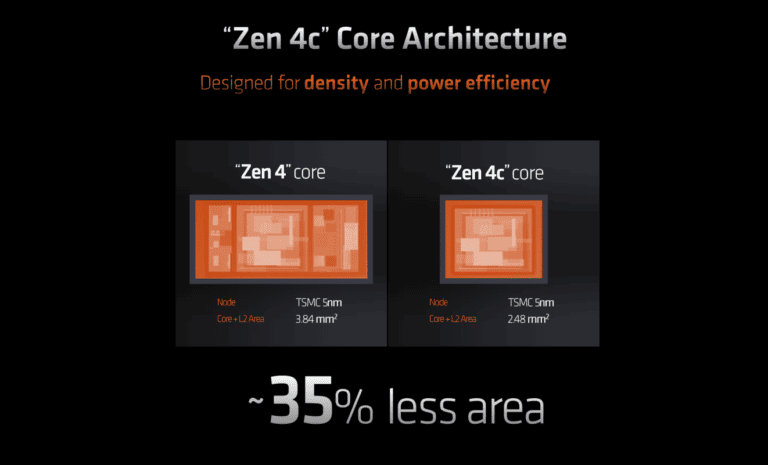AMD has produced CPUs with a hybrid architecture for laptops for the first time. While Intel first combined performance cores (P-cores) with efficiency cores (E-cores) in consumer x86 chips in early 2022 with Alder Lake, AMD is now opting for similar offerings with differently-sized cores, starting with its inclusion in thin-and-light notebooks.
AMD initially unveiled Zen 4c cores as “cloud” cores intended for the launch of AMD EPYC Bergamo server chips. Evidently, the letter “c” can also stand for something else, as these more efficient, compact cores will now also end up in thin-and-light notebooks. The Ryzen 5 7545U combines two full Zen 4 cores (384 mm2 each) with four Zen 4c cores (248 mm2 each). There’s also the new Ryzen 3 7440U, not to be confused with the old variant of the same name. From now on, this chip contains only a single full Zen 4-core and 3 Zen 4c-cores.
Windows already prepared
Hybrid architectures aren’t new. For over a decade, there have been Arm chips with a so-called big.LITTLE structure, in which powerful cores are combined with smaller, more efficient cores within the same processor. Intel chose a similar solution with the 12th generation Core series (codenamed Alder Lake) by supplementing P-cores with E-cores. Microsoft worked with Intel to make Windows 11’s thread scheduler take advantage of this. AMD can now also benefit from the work done to make hybrid chips play nice with the OS, as “many of the improvements we have made in Windows 11 are applicable to hybrid CPUs in general,” said chief software engineer at Microsoft Chris Kleynhans in 2021.
Confusing marketing
As for AMD’s specifications, the Zen 4c cores remain somewhat hidden. Whereas Intel distinguishes between P and E cores on its pages, AMD chooses to divide Zen 4 and Zen 4c explicitly only in the “advanced” specifications. This is possibly the case because the maximum turbo frequency is the same for both cores.
Either way, it remains to be seen how long it will be before AMD starts to deploy a hybrid architecture for desktops as well. Currently, the Ryzen chips on that front only contain Zen 4 cores.
Also read: AMD suggests its AI chip will make them $2 billion in a year
